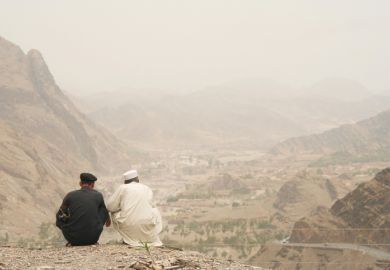Undergraduates at Pakistan’s top university who were forced to leave their dormitories abruptly and face a month of online teaching are wrestling with whether to pay for accommodation in Islamabad or return to homes where internet access is poor or non-existent.
On 27 February, administrators at Quaid-i-Azam University (QAU) shut the institution after a fight erupted between two groups of students, according to local news coverage. Later that day, police officers evicted all students from their dormitories, students said.
The university said it had acted to “prevent any further harm” and had given students 24 hours to leave – an order that dozens of students resisted, it claimed.
Since then, 79 students have been expelled, Pakistani media reported. QAU said last week that it would open dormitories and resume its academic activities for MPhil and PhD students from 20 March but would continue teaching undergraduate students in online mode for at least another month – something students say is impossible for many from rural areas.
Dileep Kumar, a third-year student of Pakistan studies, told Times Higher Education that the decision to “instantly” remove all students from their hostels has been damaging “financially, mentally and academically”.
“Police started operation and kicked out all the students who were neither involved in [the] fight nor aware of the issue. Those innocent students were also beaten by police brutally,” he said.
Syed Zafar Ullah, a second-year economics student at QAU, echoed the account.
“We were given the notice of few hours to vacate hostels, and then police and paramilitary came and they forced students out of hostels. Students were beaten very badly…our valuable belongings remained in the hostels,” he said.
Now, his chief concern is continuing classes. Since moving off campus, Mr Ullah has been staying at a private hostel in Islamabad. However, he said, he could no longer afford the cost and would need to return to his parents’ house in Balochistan province, 15 hours away.
“Now they say that for one month the class will be online…In our village [there] is no electricity, no availability of network and internet…how can I attend online classes in [my] village? It’s the biggest problem which I face now.”
He estimated that 90 per cent of students were in a similar position, with little or no access to online resources if they return home.
“This has affected our studies so much,” he said.
Asfandyar Wali, a student representative in his final year of a bachelor’s degree in history, said it was the first time that administrators had taken action to kick students out of their campus lodgings, in what he believed was an attempt to “securitise” the university.
Like his peers, he noted that the move to shift to online mode would take a heavy toll on students, most of whom come from “deprived areas”.
“Things are getting really difficult, and students have no one by their side,” he said.
In a recent statement, QAU said “the necessary repairs and security arrangements are under way and the university is likely to reopen in two to four weeks”.
THE has contacted QAU and Islamabad police for comment.
Register to continue
Why register?
- Registration is free and only takes a moment
- Once registered, you can read 3 articles a month
- Sign up for our newsletter
Subscribe
Or subscribe for unlimited access to:
- Unlimited access to news, views, insights & reviews
- Digital editions
- Digital access to THE’s university and college rankings analysis
Already registered or a current subscriber?








